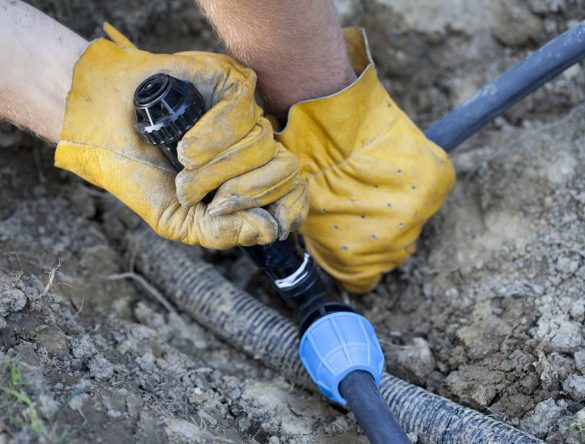-
6:30am - 5:00pm
Main Phone Number
203-629-8050 -
After Hours
Irrigation Emergency
203-223-1118 -
After Hours
Well Emergency
914-708-7063
Main Phone Number
203-629-8050Irrigation Emergency
203-223-1118Well Emergency
914-708-7063
If you plan to install a sprinkler system on your property, it is important to consider several factors before making a final decision. This is because installing a sprinkler system is a long-term investment and requires careful planning and execution. Underestimating the importance of proper planning often results in poor system performance, increased water consumption and high maintenance costs.
From the soil type to the weather conditions, we’ll provide a comprehensive guide to help you plan a sprinkler system that best meets your needs.
Knowing your soil type and its water-holding capacity can help you choose the right kind of sprinkler heads, as well as the right watering method. Clay soils hold water for longer, so you need to adjust the system’s run time and frequency of water application to avoid overwatering. On the other hand, sandy soils drain water rapidly, calling for more frequent water applications.
Local weather is another important factor to consider when designing your sprinkler system. For example, if you live in an area with high winds, you might need to adjust your sprinkler heads to avoid water being blown away. Or, perhaps you’ve gone into a hot and dry season — an automatic irrigation system that waters strategically can help save water and ensure that your lawn stays green.
The size and shape of your lawn also play a crucial role in determining the type of sprinkler system you need. Large properties may require rotors that can cover a wider area in a single rotation. On the other hand, small lawns benefit from using little sprayers that can handle the limited square footage. When planning the system’s layout, it is also important to note any unique features or obstacles in your yard, such as fences or trees.
Don’t forget about water pressure when designing your sprinkler system! If your moisture force is too high, it can result in overspray, misting, and wasted water. If your water pressure is too low, it may not provide adequate coverage, leading to under-watered areas.
Lastly, when designing your sprinkler system, it’s vital to consider your budget. The price of a sprinkler system depends on various factors, such as the type of sprinkler heads, the lawn size and the type of water source. While it may be tempting to skimp on costs, investing in quality materials that will last longer and save water over time is crucial.
For more information on protecting, improving and enhancing your lawn, contact us at Summer Rain Sprinklers. We’re happy to help you find a solution that fits your unique home and budget, from irrigation systems to landscape lighting and emergency servicing.